By Brother Chan Phap Nguyen
During last spring’s Francophone retreat, Thay gave Dharma talks on the theme of “recognizing the conditions of happiness in and around us,” a subject that is important and helpful for today’s living. Thay taught that to be able to hear the birds or see the sun rays in the morning, or to recognize that life has lovingly offered us our good eyes and strong heart, is already a source of happiness. So many people are not fortunate with their poor faculties, and countless others are suffering from serious illnesses.
One day, we had a formal lunch, a solemn and powerful event well attended by the fourfold community. Yet during the afternoon’s Dharma discussion, one practitioner shared that while the meal was something special, she gained from it neither sense of happiness nor understanding of its purpose. Further, she felt pity that monastics could be made so happy by something as insignificant as an ice-cream bar, while a few cartons would be what she herself would buy. Monastics would derive happiness from watching simple things like a cloud, a ray of sunshine, or a flower; she felt sorry for them.
I was not surprised by this sharing because I’ve known other people with similar thinking. The sharing made me reflect more deeply on the sources of happiness in my life before and after I became a monastic.
Never Satisfied
I am Vietnamese American. In high school, I studied diligently for admission to a good university. That done, I continued to work hard for a good degree so I could get a decent job to help my family in America and Vietnam. After four years of hard work, I graduated with degrees in international business and finance. I had wanted to go further for Master’s degrees in international law and international relations, but after much thinking, I decided to defer additional schooling in favor of work to help my family financially, and also to get real work experience. Just before graduation, I was fortunate to be hired by a stock brokerage company, with the work to begin one week after graduation. Everything appeared to progress as I had wished.
But my ambition did not stop there. Once employed, my next desire was to buy a house and a good car. These goals were achieved after three years of high-intensity and high-pressure work. In my job, dealing with many clients, especially wealthy ones, was difficult. There were days I left work with a headache. In seven years, I moved through two houses and was into my second car. I had a job, money, a good dwelling, and means of transportation, but I was never really satisfied with my life. I always felt I was missing something. The help I gave my family was never enough. The situation was the same with everyone around me.
 I found instances of joy in being with my family, in material things, and with travels. Every time I felt boredom, excessive work pressure, or the need to resolve some personal issue, I would travel. I visited many places, some of them with rather luxurious and elegant accommodations.
I found instances of joy in being with my family, in material things, and with travels. Every time I felt boredom, excessive work pressure, or the need to resolve some personal issue, I would travel. I visited many places, some of them with rather luxurious and elegant accommodations.
I felt happy during those travels, but upon returning home to face the busy and tense life—especially my own dissatisfaction—I began to feel the boring repetitiveness of my life. I wanted to change it.
Waking Up
When I was little, my mother used to take me to the temple to worship the Buddha and chant the sutras. I remember the lightness I felt on those occasions. Although I was too young to understand, I liked the quiet, serene atmosphere of the temples. Growing older, I continued to like those visits, but I only went to the temples when I felt my mind was unbalanced. Many people go to the temple to pray for favors, but I went to chant a sutra or to do some temple work to find peace; that was it! Every day after work, I would stop by the temple for sutra recitation.
Gradually, the wonderful words of the sutras began to penetrate my mind. I became more familiar with the way life was lived at the temple. What I most valued was the peace that I felt there. Suddenly, I began to see the beauty of monastic life. Images of the brown and saffron-yellow robes quietly entered my store consciousness. From there, the seed of a monastic life began to sprout in me.
One day while doing research on Buddhism on the Internet, I found Thay’s name and the Plum Village (PV) website. Out of curiosity, I studied the information and became interested in what I found. I began to read Thay’s books, and the more I read, the deeper I was moved. I decided to travel to PV once to check things out; sometimes, reality might not be the same as what we’ve read on the Internet or in books. I arranged my schedule to allow a one-week visit to PV. During that week, I had the opportunity to be in direct contact with the practice of mindfulness in the PV tradition. I learned to walk, sit, and breathe. In a few days, I felt there was already transformation in me: I felt light and peaceful. I liked PV’s natural settings. Thay’s Dharma talks moved me much. I felt like a person who just woke up from a deep sleep. After the week, I returned home with the vow to come back and ask to be Thay’s disciple. And true to that vow, I returned one year later and was permitted to join the monastic community.
While back in the US to rearrange my personal affairs, I continued mindfulness practice at Deer Park Monastery, another PV center in America. There, Sister Dang Nghiem gave me much guidance and help. One time, I was having dinner with her and another practitioner. That simple meal turned out to be an unforgettable experience. We were eating leisurely, while the sun was setting in the distance. No one said a word: it was enough to simply enjoy the meal and value one another’s presence. It was wonderful. I felt the energy of peace enter my body, and a sense of happiness I had never experienced before—one of peace, freedom, and contentment, so gentle and soothing.
The Joy of Non-desire
Before getting to know the Plum Village practice, I was confused between the happiness derived from sensual pleasures and the happiness derived from real peace. I had thought happiness meant having one’s desires satisfied. But desires can never be satisfied because by nature, they are bottomless. Once a desire is satisfied, another one—even larger—appears. Eventually, we become enslaved by our own desires.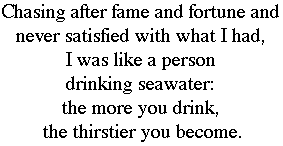
On the other hand, there is the happiness born from mental stillness, a joy that comes from the non-desire within us. Looking closely, we can see that the process of going after desires until they are satisfied brings not so much joy but a lot of suffering. Our greater joy actually comes from the moment of non-desire, which happens between the end of one desire and the beginning of the next.
For example, from the first few months of my first job, I worked hard to save for a modern car. Once I got the car, I was proud and happy for a few weeks, and then my next goal was a house. The joy of having a new car gradually disappeared, and in its place were new efforts, new worries, and new plans to gather enough money for the new house.
When we look for externally generated pleasures such as travels, good food, and luxurious dwellings, we look to satisfy just our physical needs. In the depth of our consciousness, our difficulties, sadness, loneliness, etc. are being suppressed. While sensual pleasures can bring us short moments of joy, they make our desires stronger in the long run. I had thought that graduating from a good university, having a good job, big house, beautiful car, much money in the bank, etc. would bring me happiness. But no! Looking back, I now realized I was a slave to my own desires.
Like many young men, I was drawn to fame and fortune. Chasing after fame and fortune and never satisfied with what I had, I was like a person drinking seawater: the more you drink, the thirstier you become. In those days, I had worked hard to prepare for the future and lost sight of the wonderful present. Now a monastic, I’ve discovered that happiness is something that’s already in myself; there is no need to search elsewhere. But it takes mindfulness to recognize this. Mindfulness helps us to become aware of what is happening in the present moment and to more clearly see our emotions and mental formations.
A New Ideal
Is what I am saying familiar to you? Does anything here resemble what’s inside of you? I hope you will agree from my story that not recognizing correctly our sources of happiness is a common sickness of our time. I was a youth living a worldly life. Having experienced suffering, psychological complexes, sadness, and attachments, I can identify to some extent with the feelings of many young people. Nowadays, youth are facing many kinds of pressures from society, family, school, friends, and sexual tendencies. From puberty into young adulthood, sexual needs can develop so quickly and strongly that they are difficult to control. If we do not know how to channel them, we can end up being controlled by them. Therefore, we have to deal not only with external issues, but internal ones, too.
Our society is modern today, but the more modern the world is (with computers and other electronic gadgets, for example), the more lonely and lost people can become since now fewer opportunities for personal contacts between individuals exist. Such feelings of loneliness and emptiness could take us far in the wrong direction. I think my earlier feelings of unease, worry, and loneliness came from my original ideals, which were based on the ambition for fame, wealth, and sensual pleasures. That’s why I was not happy. Now I feel happy: Thay has opened my eyes to a new life ideal: the development of understanding and love.
Dear friends! Young people like us need an ideal in life. A wholesome ideal is useful to ourselves and others. It will bring the fruit of love and happiness. The life of a young person is beautiful, like a full moon, clear and undefiled. Let’s value it and keep it well. To do so, we have to practice stopping, deep looking and listening, recognizing and transforming like Thay has taught. Our breaths and steps are the beginning of this practice. I am walking this path of practice with much joy.
I hope you could live your lives, so you could be like proud and solid pine trees. If you know how to take good care of your garden, the heart, and your ideal, you too will experience the taste of peace and happiness. If you are happy, your loved ones and others will benefit. Like one of those blue pine trees—if it knows how to send its roots deep into the earth and stand straight with solidity and dignity, its trunk and foliage will bring much refreshing shade to life.

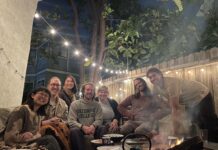















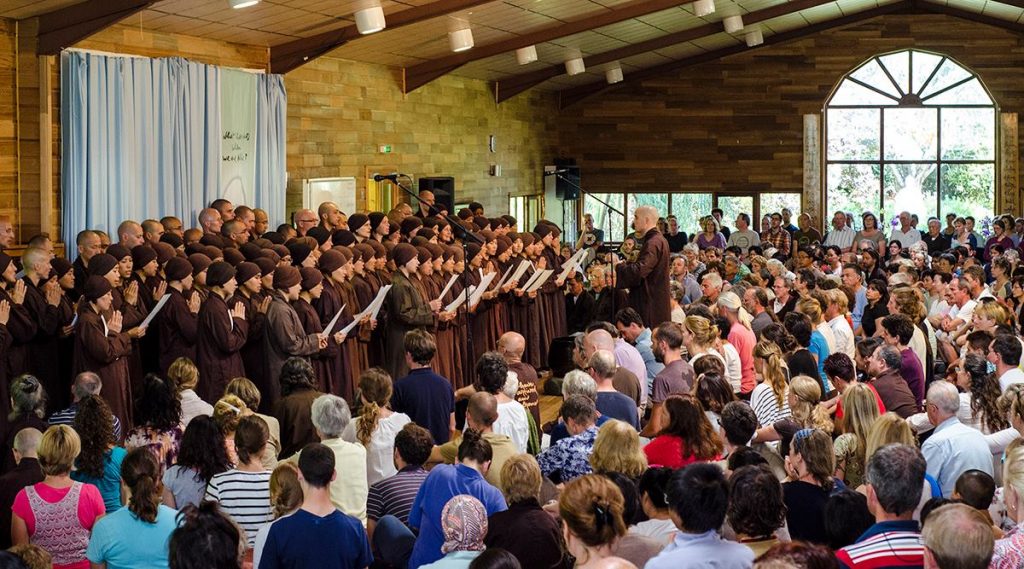

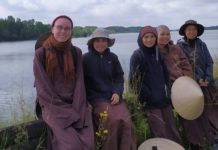

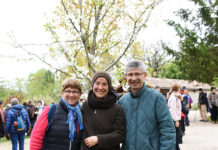
This is wonderful to read. I have been experiencing similar challenges in the world, and although I have determined that monastic life is not the best path for me, living a mindful and joyful life is always a fruitful practice! I would love to hear more from young monastics about the struggles they faced as young adults, especially struggles with sexuality in modern society.